The best practices for recycling DB6 and H13 steels
Introduction
Recycling and sustainability have become crucial aspects of the modern steel industry. With the increasing demand for high-performance tool steels such as DB6 and H13, manufacturers and industries need to adopt efficient recycling and sustainable manufacturing practices. Recycling these steels not only conserves natural resources but also significantly reduces the environmental footprint by minimizing industrial waste and decreasing carbon emissions.
In this article, we will explore the best practices for recycling DB6 and H13 steels, highlight the importance of sustainability, and discuss innovative methods being used to ensure a greener future for the steel industry.
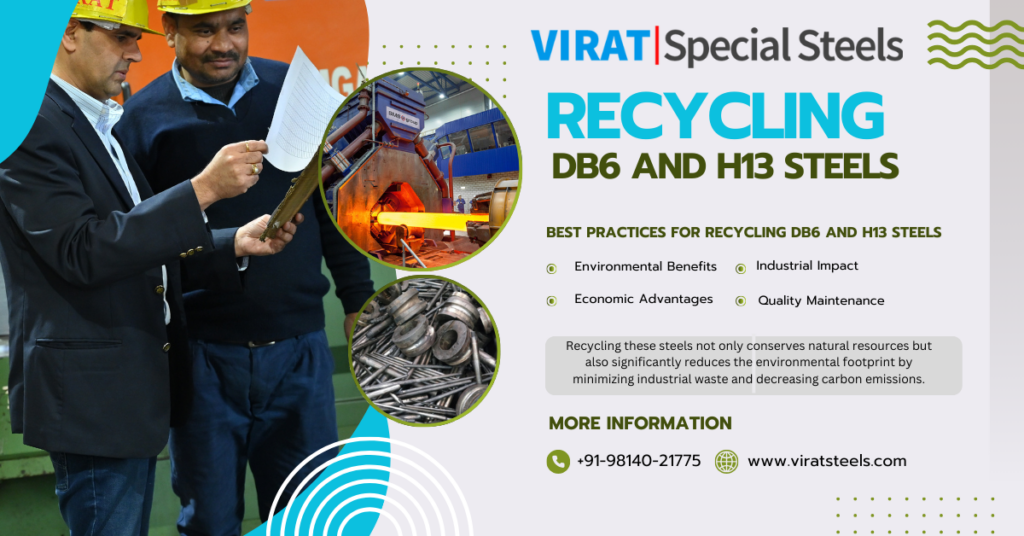
Understanding DB6 and H13 Steels
What is DB6 Steel?
DB6 is a hot work tool steel known for its high toughness, wear resistance, and excellent thermal stability. It is widely used in applications such as:
- Die casting
- Forging dies
- Plastic molds
What is H13 Steel?
H13 is another hot work tool steel, but it is recognized for its high strength, shock resistance, and superior heat resistance. It is commonly used in:
- High-pressure die casting
- Extrusion dies
- Cutting tools
Why Are These Steels Preferred?
Both DB6 and H13 are extensively used due to their long lifespan, excellent mechanical properties, and ability to withstand high temperatures. However, their wide usage also means significant material waste if not recycled efficiently, making sustainability a key concern.
Importance of Recycling DB6 and H13 Steels
Recycling DB6 and H13 tool steels provides numerous environmental, economic, and industrial benefits, such as:
Environmental Benefits
- Reduction in Mining Activities: Less reliance on mining for raw materials, leading to lower deforestation and soil degradation.
- Lower Carbon Footprint: Recycling steel emits less CO₂ compared to new steel production.
- Waste Reduction: Prevents discarded tools and machine parts from ending up in landfills.
Economic Advantages
- Cost Savings: Recycled steel is cheaper to process compared to producing new steel from iron ore.
- Job Creation: The recycling industry generates employment opportunities in steel collection, processing, and re-manufacturing.
Industrial Impact
- Reliable Supply Chain: Reduces dependency on fluctuating raw material markets.
- Quality Maintenance: Ensures industries maintain consistent material properties without resource depletion.
Best Practices in Recycling DB6 and H13 Steels
To ensure effective recycling of DB6 and H13 steels, industries should follow these best practices:
1. Collection and Sorting of Scrap
- Segregate DB6 and H13 steel scraps based on composition and purity.
- Remove contaminants such as coatings, oils, and residual chemicals before recycling.
2. Efficient Melting and Refining Processes
- Use energy-efficient furnaces such as electric arc furnaces (EAFs) for melting steel scrap.
- Introduce vacuum degassing techniques to eliminate impurities and enhance steel quality.
3. Minimizing Energy Consumption
- Utilize waste heat recovery systems to optimize energy usage during melting.
- Improve process automation to reduce excess energy loss.
The Role of Sustainable Steel Production
Sustainability in DB6 and H13 steel production goes beyond just recycling. Manufacturers must also adopt eco-friendly practices to ensure a minimal carbon footprint.
1. Energy-Efficient Manufacturing
- Use electric arc furnaces (EAFs) instead of traditional blast furnaces.
- Upgrade equipment and technology for better process efficiency.
2. Reducing Carbon Emissions
- Implement low-carbon production techniques, such as using hydrogen instead of coal.
- Reduce waste production through lean manufacturing principles.
3. Use of Renewable Energy
- Switch to renewable power sources, such as solar or wind energy, in manufacturing plants.
Challenges in Recycling DB6 and H13 Steels
Despite the advantages, recycling DB6 and H13 steels comes with several challenges:
1. Contamination Issues
- Impurities such as paint, coatings, and lubricants can alter the quality of recycled steel.
2. High Recycling Costs
- Advanced sorting and refining processes require costly equipment and technology.
3. Technological Limitations
- Some recycling facilities lack the necessary machinery to process tool steels effectively.
4. Market Demand for Recycled Steel
- Industries prefer virgin steel due to consistent material properties, making the demand for recycled DB6 and H13 relatively low.
Innovations in Steel Recycling
Technological advancements are transforming DB6 and H13 steel recycling.
1. AI-Based Scrap Sorting
- Automated sorting systems use AI and sensors to classify scrap based on chemical composition.
2. Eco-Friendly Melting Technologies
- Innovations such as plasma arc furnaces enhance steel melting efficiency.
3. Closed-Loop Recycling
- Encourages industries to reuse steel waste internally to minimize material loss.
4. Sustainable Alloying Techniques
- Research focuses on developing alternative alloy compositions with improved recyclability.
Regulatory Compliance and Sustainability Standards
Global standards promote sustainable steel recycling:
1. Government Regulations
- Policies such as extended producer responsibility (EPR) require manufacturers to manage steel waste efficiently.
2. International Standards (ISO 14001, ISO 50001)
- ISO 14001: Guidelines for environmental management systems.
- ISO 50001: Framework for improving energy efficiency in steel production.
3. Industry Best Practices
- Leading steel producers follow green manufacturing protocols to align with climate action goals.
The Future of Sustainable Steel Production
The steel industry is embracing sustainable and innovative solutions:
1. Green Steel Manufacturing
- Companies are shifting towards hydrogen-based steel production, reducing carbon emissions.
2. Circular Economy Integration
- Instead of linear waste disposal, manufacturers are adopting closed-loop recycling models.
3. Carbon Capture in Steel Production
- Emerging carbon capture and storage (CCS) technologies help trap emissions before they enter the atmosphere.
Conclusion
The recycling and sustainability of DB6 and H13 steels are essential for reducing industrial waste, conserving resources, and minimizing environmental impact. By following best practices, such as efficient collection, processing, and adoption of green technologies, industries can enhance sustainability while maintaining cost-efficiency.
The future of sustainable steel manufacturing lies in embracing innovations, complying with global regulations, and shifting towards eco-friendly production methods. Every effort in steel recycling brings us one step closer to a greener planet!
FAQs
1. Why is recycling DB6 and H13 steels important?
Recycling these steels reduces waste, lowers production costs, and helps conserve natural resources and energy.
2. What challenges exist in recycling tool steels?
Common challenges include contamination, high recycling costs, technological limitations, and fluctuating market demand.
3. What are the best methods for improving steel recycling efficiency?
Using advanced sorting technologies, energy-efficient melting processes, and closed-loop recycling systems helps optimize efficiency.
4. How does sustainable steel production impact the environment?
It reduces carbon emissions, conserves energy, and minimizes industrial waste, contributing to a healthier planet.
5. What is the future of sustainable steel recycling?
The future includes green hydrogen-based production, circular economy models, and carbon capture technologies for a low-carbon steel industry.
Applications of H13 Steel in Aerospace and Defense Industries
H13 steel is a versatile tool steel with exceptional properties such as heat resistance, toughness, and wear resistance, making it a popular choice for industries requiring high performance. Its ability to retain its properties under extreme temperatures and stress makes it a staple in aerospace and defense sectors.
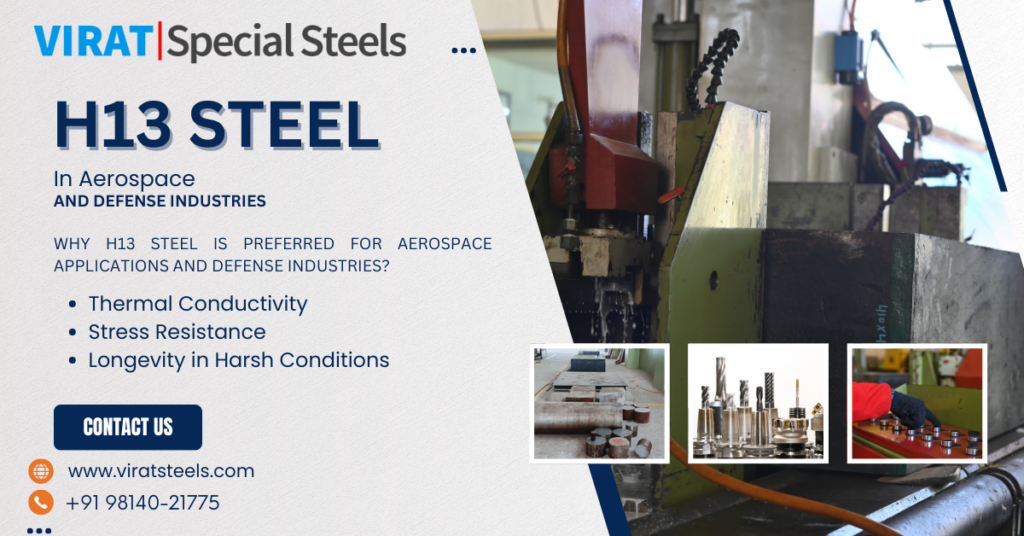
Overview of H13 Steel Composition and Properties
H13 steel is primarily composed of chromium, molybdenum, and vanadium, providing:
- High strength: Resilience to intense forces.
- Heat resistance: Suitable for high-temperature environments.
- Wear resistance: Longevity under constant use.
This unique composition equips H13 steel to meet the challenges of demanding industrial applications.
Importance of H13 Steel in Industrial Applications
Industries rely on H13 steel for its adaptability in high-performance contexts. Its structural integrity, even under stress, ensures operational efficiency and cost-effectiveness over time.
Why H13 Steel Is Preferred for Aerospace Applications
In aerospace, material performance is critical. H13 steel delivers advantages that align with the sector’s stringent demands.
Key Properties of H13 Steel Advantageous for Aerospace
- Thermal Conductivity: Ensures stability during rapid temperature changes.
- Stress Resistance: Retains structure under high pressure.
Types of Aerospace Components Made with H13 Steel
- Engine Parts: Endure high temperatures and mechanical stress.
- Aerospace Tooling Equipment: Crucial for precision in manufacturing processes.
Applications of H13 Steel in Aerospace Industries
Heat-Resistant Aerospace Engine Components
The aerospace industry requires materials that endure extreme heat during operation, such as jet engine turbines and rocket nozzles. H13 steel’s ability to resist thermal degradation ensures consistent performance even in these high-stress environments.
Aircraft Tooling and Manufacturing Dies
Precision is non-negotiable in aerospace manufacturing. H13 steel is indispensable for crafting tools and dies that remain accurate across extensive production cycles. This minimizes downtime and increases productivity.
Why H13 Steel Is Ideal for Defense Applications
H13 steel is a go-to material for defense applications where reliability and strength are essential.
Robustness and Reliability Under Tough Conditions
Military equipment often operates under harsh conditions, from arid deserts to frigid Arctic zones. H13 steel withstands these extremes, ensuring longevity and performance in defense scenarios.
Versatility of H13 Steel in Defense
From crafting ballistic components to manufacturing military vehicles, the adaptability of H13 steel is unparalleled. Its ability to handle high stress without deformation makes it an ideal candidate for a variety of defense-related uses.
Future Outlook for H13 Steel in Aerospace and Defense
The future of H13 steel in these industries looks promising as the demand for high-performance materials continues to grow.
Predicted Growth in Applications
With the expansion of aerospace technology, such as hypersonic aircraft and reusable rockets, the demand for materials that offer excellent thermal and mechanical properties will increase. Similarly, advanced defense projects will rely heavily on the performance reliability of H13 steel.
Evolving Material Enhancements
Research in material science is leading to improved variants of H13 steel with higher stress resistance, reduced weight, and better machinability. These advancements will further solidify H13’s position as a cornerstone of aerospace and defense manufacturing.
Conclusion
H13 steel has firmly established itself as a key player in the aerospace and defense industries. Its unique properties of heat resistance, toughness, and durability allow it to meet the stringent demands of high-performance environments. From manufacturing jet engines to precision dies in military tooling, its applications demonstrate unmatched reliability and versatility. As innovations continue to refine this material, H13 steel will remain critical to the success and advancement of aerospace and defense technologies.
Mode of Supply:
Virat Special Steels is the largest Supplier & Stockiest of H13 Steel in India. Consult our team who will assist you for H-13/ DIN 2344 / AISI H13 steel query. https://www.viratsteels.com/h13.html
Size Range in Forged / Rolled Bars:
Rounds: 13mm Dia to 1500mm Dia
Rectangular: Thickness 13mm – 500mm / Width 13mm to 1500mm
For more information or to discuss your steel needs, Virat Special Steels invites you to reach out through their contact details provided, ensuring a professional and informative experience.
Any further queries feel free to contact us :
🌐https://www.viratsteel.in 📬 info@viratsteels.com ☎+91 98140-21775
FAQs on H13 Steel Applications
1. What makes H13 steel unique compared to other steels?
H13 steel’s high heat resistance, durability, and wear resistance set it apart, making it ideal for extreme environments like aerospace and defense applications.
2. What are the cost implications of using H13 steel in aerospace?
While the initial costs of H13 steel may be higher, its longevity and reduced maintenance requirements offer excellent long-term cost-effectiveness.
3. Is H13 steel environmentally friendly for defense industries?
Innovations like eco-friendly manufacturing processes and recyclable materials are helping make H13 steel more sustainable.
4. How does H13 steel handle high temperatures?
Thanks to its exceptional thermal conductivity and resistance to heat cycling, H13 steel maintains stability and performance under extreme heat.
5. What are the future innovations anticipated for H13 steel?
Expected advancements include enhanced alloy compositions, better weight-to-strength ratios, and sustainable manufacturing processes.
Advantages of Using DIN 2714 in Modern Manufacturing
In today’s world, where sustainability and environmental responsibility have become global priorities, the manufacturing industry is evolving to adopt greener technologies and practices. A significant contributor to this shift is the strategic use of advanced materials like DIN 2714, which not only enhances performance but also offers considerable environmental benefits.
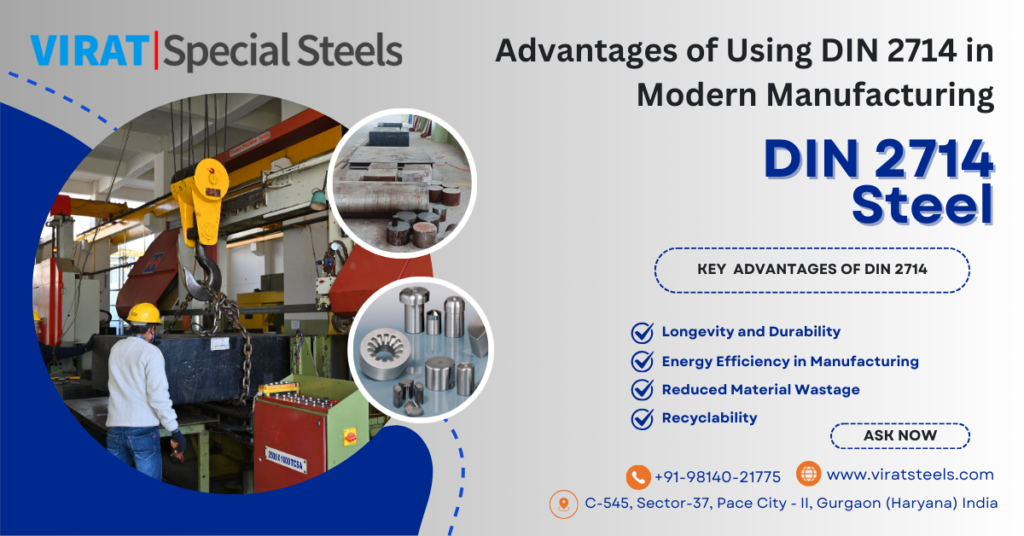
Understanding DIN 2714
DIN 2714 is a high-quality tool steel known for its excellent toughness, wear resistance, and high strength. It’s widely utilized in the forging and die-making industries to produce components that endure extreme mechanical stress. Its exceptional properties contribute to reduced waste, energy efficiency, and sustainable production processes.
Key Environmental Advantages of DIN 2714
1. Longevity and Durability:
The primary environmental advantage of DIN 2714 is its exceptional durability. Components made from this steel are resilient and maintain their structural integrity even under severe conditions. This reduces the frequency of replacements, leading to decreased consumption of raw materials and reduced waste in manufacturing. By lasting longer, DIN 2714 components contribute to a circular economy, minimizing resource depletion.
2. Energy Efficiency in Manufacturing:
The advanced metallurgical properties of DIN 2714 allow for more efficient manufacturing processes. Its high thermal resistance means fewer energy-intensive treatments are required during production. Furthermore, the improved tool performance reduces the downtime and energy associated with frequent maintenance or replacement.
3. Reduced Material Wastage:
The toughness and precision-forming capabilities of DIN 2714 ensure minimal material wastage during machining and forging operations. Manufacturers benefit from precise tolerances and reduced scrap, directly contributing to environmentally friendly production practices.
4. Recyclability:
Tool steels like DIN 2714 are highly recyclable. End-of-life products made from this steel can be melted and repurposed, conserving natural resources and minimizing the environmental impact of metal extraction. This closed-loop recycling system aligns with the goals of sustainable development and resource optimization.
5. Improved Operational Efficiency:
The enhanced performance characteristics of DIN 2714 lead to reduced machine wear and operational inefficiencies. Machines equipped with DIN 2714 components can operate for extended periods with consistent performance, translating to lower energy consumption and reduced carbon emissions.
Supporting Green Manufacturing Practices:
The use of DIN 2714 in modern manufacturing aligns seamlessly with environmentally conscious practices such as lean manufacturing and green supply chain management. Manufacturers can integrate this material into their operations to meet stringent environmental regulations and standards, such as ISO 14001. Moreover, by choosing materials like DIN 2714, companies demonstrate a commitment to environmental sustainability, bolstering their reputation in an increasingly eco-conscious market.
Conclusion
Incorporating advanced materials like DIN 2714 into modern manufacturing processes is a step forward in achieving sustainability and environmental stewardship. Its longevity, energy efficiency, recyclability, and ability to minimize waste make it a preferred choice for industries striving to reduce their carbon footprint. By adopting DIN 2714, manufacturers not only enhance operational efficiency but also contribute to a greener future for generations to come.
Virat Special Steels is proud to provide premium-grade DIN 2714 tool steel, ensuring both performance excellence and a commitment to environmental sustainability. Let’s work together to build a cleaner, greener industrial landscape.
Understanding the Role of Chromium in H13 Steel Composition
Overview of Tool Steels
Tool steels are a unique class of alloys designed to endure extreme conditions. With their exceptional hardness, heat resistance, and wear resistance, they are an indispensable part of industries such as manufacturing, automotive, and aerospace.
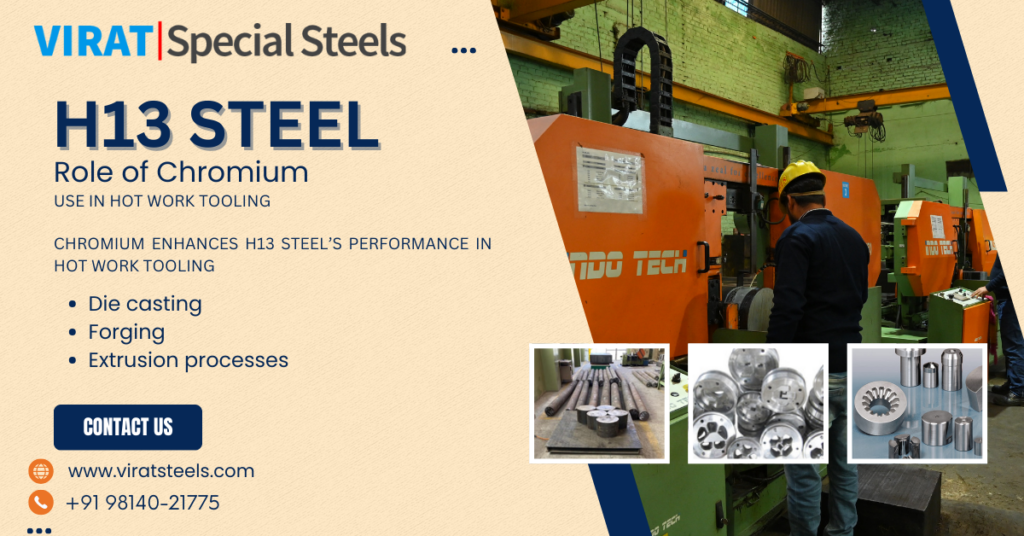
What Makes H13 Steel Special?
H13 steel is a premium-grade hot work tool steel renowned for its strength and versatility. Thanks to its well-balanced composition, H13 performs admirably under thermal cycling, maintaining high durability and toughness. One standout component of H13 steel is chromium, a key player in its overall performance.
The Role of Chromium in Steel Alloys
Why Chromium is an Essential Alloying Element
Chromium has long been valued in steel manufacturing for enhancing durability and corrosion resistance. This element forms a protective oxide layer that acts as a barrier against oxidative damage, making it a cornerstone in high-performance steels like H13.
Impact on Mechanical Properties
Chromium not only prevents corrosion but also improves hardness and tensile strength. In H13 steel, the presence of chromium elevates the alloy’s ability to handle mechanical and thermal stress without compromising integrity.
Chemical Composition of H13 Steel
Key Alloying Elements
H13 steel comprises several essential elements, including iron, carbon, chromium, molybdenum, vanadium, and silicon. Each element contributes to its properties, but chromium plays a prominent role in defining its functionality.
| Element | Approx. Percentage (%) |
| Carbon | 0.32–0.45 |
| Chromium | 4.75–5.50 |
| Molybdenum | 1.10–1.75 |
| Vanadium | 0.80–1.20 |
Chromium Content and Its Significance
The 4.75-5.50% chromium in H13 is optimal for achieving hardness, resistance to wear, and thermal stability. This concentration ensures the alloy’s adaptability across various industrial applications.
Effects of Chromium on H13 Steel
Chromium’s Contribution to Hardness
Hardness is one of H13 steel‘s most desirable traits, largely due to chromium. By forming carbides, chromium enhances grain structure, leading to a hard and durable material.
Enhancing Corrosion Resistance
In environments prone to oxidation or moisture exposure, chromium fortifies H13 steel with excellent corrosion resistance. This property is crucial for tools exposed to harsh chemical or thermal conditions.
Role in Heat Resistance and Strength
H13’s heat treatment potential is a direct result of its chromium content. The steel retains its strength and dimensional stability, even at elevated temperatures.
Applications of H13 Steel and the Role of Chromium
Industries That Rely on H13 Steel
H13 steel is an essential material in aerospace, automotive, and heavy machinery industries. Its ability to maintain structural integrity under stress makes it invaluable for demanding applications.
Use in Hot Work Tooling
Chromium enhances H13 steel’s performance in hot work tooling, such as die casting, forging, and extrusion processes. Its resistance to thermal fatigue ensures longevity and efficiency.
Conclusion
Chromium plays a pivotal role in the exceptional performance of H13 steel, acting as a cornerstone for its hardness, corrosion resistance, and thermal stability. This alloying element works synergistically with other materials to create a robust and versatile steel ideal for high-stress industrial applications. By optimizing chromium levels and adopting innovative practices, industries can continue to rely on H13 steel for decades to come.
Mode of Supply:
Virat Special Steels is the largest Supplier & Stockiest of H13 Steel in India. Consult our team who will assist you for H-13/ DIN 2344 / AISI H13 steel query. https://www.viratsteels.com/h13.html
Size Range in Forged / Rolled Bars:
Rounds: 13mm Dia to 1500mm Dia
Rectangular: Thickness 13mm – 500mm / Width 13mm to 1500mm
For more information or to discuss your steel needs, Virat Special Steels invites you to reach out through their contact details provided, ensuring a professional and informative experience.
Any further queries feel free to contact us :
🌐https://www.viratsteel.in 📬 info@viratsteels.com ☎+91 98140-21775
FAQs
What is the primary function of chromium in H13 steel?
Chromium enhances hardness, corrosion resistance, and heat resistance, making H13 steel suitable for high-stress applications.
Does chromium affect machinability in H13 steel?
Yes, chromium improves wear resistance and surface finish, but excessive amounts may reduce machinability due to increased hardness.
Why is chromium combined with other elements in H13 steel?
Chromium works synergistically with molybdenum, vanadium, and carbon to create a balanced alloy with exceptional properties like toughness and thermal stability.
How does chromium improve the lifespan of H13 steel tools?
Chromium enhances wear resistance and prevents oxidation, resulting in durable tools that require less frequent maintenance or replacement.
What are the future trends for chromium in steel alloys?
Advancements in material science aim to refine chromium’s interaction with other elements, while sustainable alloying practices make its use more eco-friendly.
The Future of Tool Steel: Innovations with DIN 2344 and H13
In the evolving world of manufacturing, the materials used to shape, mold, and cut have a direct impact on productivity and quality. Tool steels play a critical role in this landscape, with DIN 2344 and H13 standing out as industry leaders. Known for their exceptional thermal resistance, hardness, and strength, these grades are the backbone of tools, molds, and dies in industries such as automotive, aerospace, and die-casting. In this article, we’ll explore the significance of these materials, examine ongoing innovations, and understand how companies like Virat Special Steels contribute to shaping the future of tool steel.
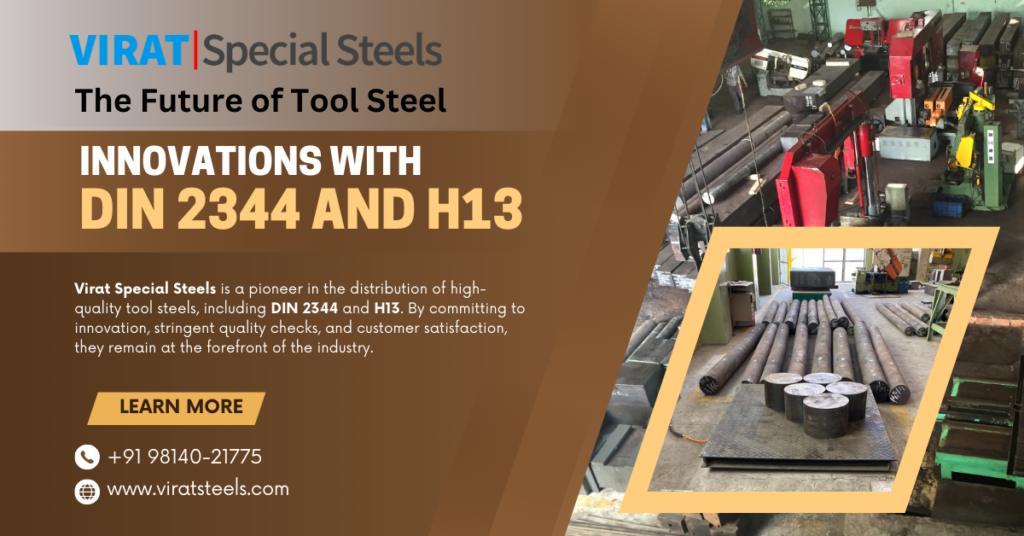
The Role of Tool Steel in Manufacturing and Industry
Tool steels are indispensable for industries that demand precision and durability. Used extensively in the production of cutting tools, molds, and dies, these alloys must endure extreme conditions, from high temperatures to heavy wear. Without them, high-quality manufacturing would simply not be possible. Automotive industries rely on tool steels for die-casting, while aerospace engineering depends on these materials for components exposed to high temperatures and stresses. In short, tool steels are the unsung heroes enabling modern engineering feats.
What Makes DIN 2344 and H13 Stand Out?
Composition and Properties of DIN 2344
DIN 2344 is a chromium-molybdenum-vanadium alloyed steel prized for its high thermal resistance and toughness. It maintains hardness even at elevated temperatures, making it a preferred choice for hot-working tools like forging dies and extrusion presses. Key properties include:
- Exceptional wear resistance.
- High tensile strength.
- Excellent machinability.
Characteristics and Features of H13
H13 steel, part of the H-series family, is well-known for its versatility and toughness. It’s often chosen for die-casting and plastic mold tooling, thanks to its outstanding thermal fatigue resistance and ease of fabrication. Its main properties are:
- Superior thermal conductivity.
- Resistance to cracking under repeated heating and cooling cycles.
- High flexibility for complex shaping.
Innovations Driving the Future of Tool Steel
The tool steel industry has seen several groundbreaking advancements. Let’s delve into some of the most significant ones:
- Advanced Alloying Techniques
Researchers are experimenting with alloying elements like cobalt and niobium to improve the thermal and wear resistance of tool steels. Such innovations push the limits of performance. - Additive Manufacturing and 3D Printing
3D printing is revolutionizing tool steel production by enabling intricate designs and reducing material waste. Industries are now combining traditional methods with 3D technologies for optimal results. - Improved Heat Treatment Processes
Heat treatment plays a pivotal role in enhancing tool steel properties. Modern techniques such as vacuum hardening ensure precision in achieving desired hardness and toughness.
Advantages of Modern Tool Steel Innovations
New innovations in DIN 2344 and H13 steels offer several benefits:
- Durability: These steels withstand high temperatures and extreme pressures without significant wear.
- Longevity: Enhanced resistance to thermal fatigue and cracking translates into longer tool lifespans, reducing downtime and maintenance costs.
- Efficiency: Advanced manufacturing techniques improve energy usage and reduce material waste.
Comparing DIN 2344 and H13 Tool Steels
Below is a snapshot of their key differences:
| Property | DIN 2344 | H13 |
| Composition | Cr, Mo, V | Cr, Mo, Si, V |
| Thermal Resistance | High | Very High |
| Applications | Forging, extrusion | Die-casting, molds |
Applications of DIN 2344 and H13
Both steels are tailored to specific needs:
- DIN 2344: Ideal for extrusion tooling and hot forging, thanks to its resistance to thermal shock.
- H13: Perfect for plastic injection molding, die-casting, and high-temperature aerospace components.
Environmental Sustainability and Tool Steels
Modern practices focus on sustainability. From reducing energy-intensive processes to emphasizing recycling, the industry is working toward a smaller environmental footprint. The longevity of DIN 2344 and H13 further minimizes the need for replacements, aligning with eco-friendly goals.
Future Prospects of DIN 2344 and H13
As industries move toward automation and more advanced technologies, the demand for high-performing materials like DIN 2344 and H13 is set to rise. Innovations in metallurgy and 3D printing will only increase their applications.
Challenges in the Tool Steel Industry
Despite advancements, challenges persist. Manufacturers face supply chain disruptions, the rising cost of raw materials, and the need to balance quality with affordability. Addressing these challenges requires collective efforts from stakeholders, including suppliers like Virat Special Steels.
The Role of Companies Like Virat Special Steels
Virat Special Steels is a pioneer in the distribution of high-quality tool steels, including DIN 2344 and H13. By committing to innovation, stringent quality checks, and customer satisfaction, they remain at the forefront of the industry.
Key Takeaways
- Tool steels like DIN 2344 and H13 are integral to modern manufacturing.
- Innovations are enhancing their performance and extending their applications.
- Companies like Virat Special Steels are instrumental in meeting the growing demands of the industry.
FAQs About Tool Steel
- What makes DIN 2344 unique compared to other tool steels?
Its ability to maintain hardness at high temperatures and resist wear sets it apart. - Why is H13 preferred in certain industries?
H13 combines versatility and thermal fatigue resistance, making it ideal for die-casting and molds. - How does Virat Special Steels ensure the quality of its products?
Rigorous testing, advanced manufacturing techniques, and expert handling ensure top-notch quality. - Can DIN 2344 and H13 be recycled efficiently?
Yes, their high-grade compositions make them suitable for recycling without significant loss of quality. - What industries are likely to adopt future innovations in tool steels?
Automotive, aerospace, and renewable energy sectors will likely benefit the most.
Virat Special Steels is the largest Supplier & Stockiest of H13 Steel in India. Consult our team who will assist you for H-13/ DIN 2344 / AISI H13 steel query. https://www.viratsteels.com/h13.html
Size Range in Forged / Rolled Bars:
Rounds: 13mm Dia to 1500mm Dia
Rectangular: Thickness 13mm – 500mm / Width 13mm to 1500mm
For more information or to discuss your steel needs, Virat Special Steels invites you to reach out through their contact details provided, ensuring a professional and informative experience.
Any further queries feel free to contact us :
🌐https://www.viratsteel.in 📬 info@viratsteels.com ☎+91 98140-21775
Is DB6 Steel the Right Choice for Your Manufacturing Needs?
When it comes to precision manufacturing, choosing the right steel can make or break your product. DB6 steel, a high-performance grade, is widely recognized for its reliability and performance. But is it the right fit for your specific needs? In this guide, we’ll explore the unique properties, applications, and benefits of DB6 steel to help you make an informed decision.
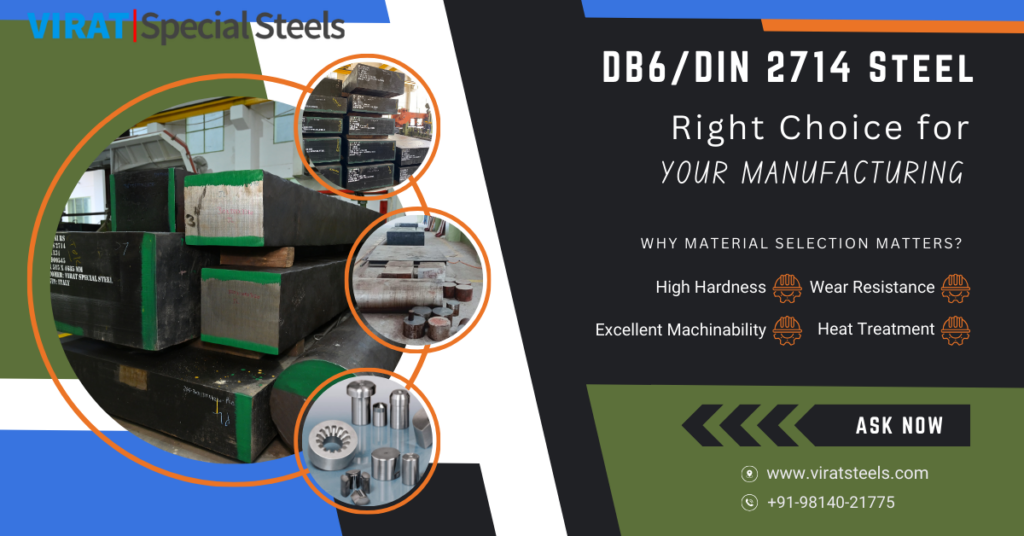
Introduction to DB6 Steel
What Is DB6 Steel?
DB6 steel is a high-quality tool steel renowned for its exceptional toughness and wear resistance. It falls under the hot-work tool steel category, making it a preferred material for various demanding industrial applications. Manufactured to precise standards, it is designed to handle extreme pressures and temperatures without compromising its integrity.
Key Features and Characteristics of DB6 Steel
DB6 steel is characterized by:
- High hardness, ensuring durability during intense usage.
- Superior machinability, reducing manufacturing time.
- Heat treatability, providing the flexibility to customize hardness levels.
Its balanced composition allows it to perform consistently in high-stress environments, making it a top choice for tool and die applications.
The Importance of Choosing the Right Steel for Manufacturing
Why Material Selection Matters
Material selection plays a critical role in ensuring product reliability and performance. Subpar material can result in premature wear, production inefficiencies, and costly replacements. Using high-grade steels like DB6 ensures your components are built to last and perform under challenging conditions.
Impact on Performance and Cost-Efficiency
Choosing the right steel influences both upfront costs and operational expenses. High-quality steels, such as DB6, may seem costlier initially, but their durability and lower maintenance requirements lead to significant savings in the long run.
Properties That Make DB6 Steel Stand Out
High Hardness and Wear Resistance
DB6 steel boasts excellent resistance to abrasion and surface wear. Its high hardness ensures prolonged tool life, even under rigorous operating conditions.
Excellent Machinability
One of DB6’s standout features is its machinability. Despite its strength, it allows for smooth cutting and shaping, which streamlines production processes and minimizes downtime.
Heat Treatment Capabilities
DB6 steel is highly adaptable to heat treatment. This capability allows manufacturers to achieve optimal hardness levels tailored to their applications, enhancing the material’s versatility.
Common Applications of DB6 Steel
Tool and Die Manufacturing
DB6 steel is widely used in crafting tools and dies, where precision and durability are critical. Its resistance to deformation under high stress makes it a top choice for this sector.
Applications in Plastic Moulding and Die Casting
The high thermal conductivity of DB6 steel makes it ideal for plastic molding and die casting. It retains its properties even in repeated high-temperature cycles, ensuring product consistency.
Heavy-Duty Industrial Components
For industries requiring robust components—such as automotive and aerospace—DB6 steel provides unmatched strength and reliability.
DB6 Steel vs Other Tool Steels
Comparison with D2 Steel
DB6 stands out against popular alternatives like D2 steel due to its superior toughness and wear resistance. While D2 is excellent for cold-work applications, DB6 excels in hot-work settings where thermal stress is a concern.
How DB6 Outshines Standard Grades
Compared to generic tool steels, DB6 delivers a perfect balance of hardness, toughness, and machinability. Its consistent performance across demanding environments sets it apart as a premium option.
Factors to Consider When Choosing DB6 Steel
Assessing Your Specific Application Needs
Evaluate the conditions your materials will face—temperature, stress, and exposure. If high-pressure or high-temperature operations are involved, DB6 steel is likely a strong contender.
Cost Analysis and Long-Term Value
While DB6 steel may come with a higher price tag, its durability reduces the need for frequent replacements, ensuring cost-efficiency over time.
Availability and Supply Chain Considerations
Ensure your supplier has a reliable stock of DB6 steel. Trusted providers like Virat Special Steels offer consistent quality and timely deliveries to prevent production delays.
Benefits of Choosing DB6 Steel from Virat Special Steels
Unmatched Quality Standards
Virat Special Steels is renowned for its high-grade materials. Their DB6 steel undergoes stringent quality checks to meet global manufacturing standards.
Reliable Customer Support and Supply Chains
With an extensive distribution network, Virat Special Steels ensures timely supply and excellent after-sales support, making them a preferred choice for manufacturers.
How can I contact Virat Special Steels for inquiries or orders?
You can reach Virat Special Steels through:
- Phone: +91-98140 21775
- Email: info@viratsteels.com
- Website: www.viratsteels.com
Their offices are located in Gurgaon, Haryana, and Ludhiana, Punjab, India. For more detailed information, you can visit their official website or contact their customer service team.
Why H13 Tool Steel Is Essential for Injection Molding?
When it comes to injection molding, the choice of material for the mold plays a pivotal role in determining efficiency, durability, and product quality. Among the plethora of options, H13 tool steel stands out as a versatile and reliable choice for mold-making. Its exceptional properties make it indispensable in the injection molding process, ensuring enhanced performance and long-term benefits.
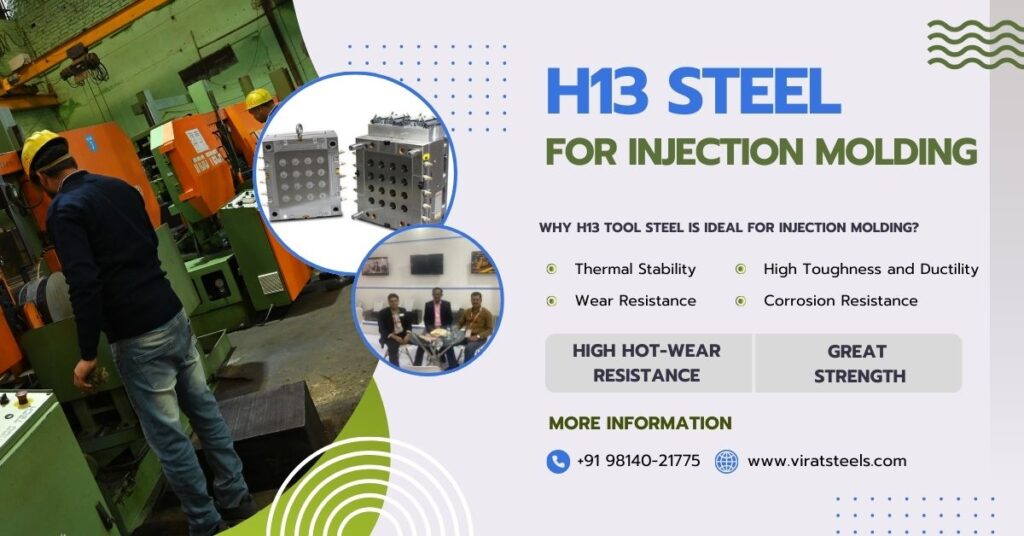
Understanding H13 Tool Steel
H13 tool steel is a chromium-molybdenum hot work steel known for its outstanding performance in high-temperature applications. Its robust composition includes:
- Carbon (0.32–0.45%) for strength.
- Chromium (4.75–5.5%) for corrosion resistance.
- Molybdenum (1.10–1.75%) and Vanadium (0.80–1.20%) for heat and wear resistance.
The alloy’s unique combination of these elements delivers an unmatched balance of hardness, toughness, and thermal stability, making it a top choice for high-pressure and high-heat processes like injection molding.
Importance of Tool Steel in Injection Molding
In injection molding, molds endure extreme temperatures, high pressures, and repetitive cycles. Tool steel directly impacts the:
- Lifespan of the mold: Durable steel reduces wear and tear.
- Product quality: Ensures dimensional accuracy and surface finish.
- Production efficiency: Decreases downtime and maintenance costs.
H13 tool steel, in particular, rises above these challenges due to its optimized properties.
Why H13 Tool Steel Is Ideal for Injection Molding
Several qualities make H13 tool steel a favorite for mold-makers:
- Thermal Stability: Its ability to withstand extreme temperatures ensures consistent performance even under intense heat cycles.
- Wear Resistance: With exceptional hardness and composition, it resists abrasive forces, prolonging mold life.
- High Toughness and Ductility: These traits make H13 ideal for creating intricate mold designs without the risk of cracking.
- Corrosion Resistance: When exposed to cooling and lubricating fluids, H13 resists degradation, enhancing longevity.
Thermal Conductivity of H13 and Its Impact on Efficiency
Effective heat transfer during injection molding is crucial for faster cycle times and better product quality. H13 tool steel offers excellent thermal conductivity, ensuring:
- Uniform cooling across the mold surface.
- Reduced cycle times, improving productivity.
- Improved precision by minimizing warping and defects in molded parts.
Hardness and Tempering Ability
The durability of a mold heavily depends on its hardness. H13 excels in maintaining hardness under high-stress conditions. Furthermore, it boasts remarkable tempering resistance, which allows:
- Multiple cycles of reheating without losing integrity.
- A steady balance between hardness and toughness, essential for prolonged mold usage.
Cost-Effectiveness of H13 Tool Steel
While H13 tool steel may have a higher upfront cost than other materials, it compensates by:
- Extending mold life: Reducing the frequency of replacements.
- Lowering maintenance needs: With reduced susceptibility to wear and tear.
- Boosting production efficiency: Thanks to reduced downtime and enhanced productivity.
The long-term benefits far outweigh the initial expense, making H13 a highly cost-effective investment.
Customizability and Versatility of H13
H13 tool steel adapts to various applications, accommodating different types of plastic resins and operating conditions. Its ability to withstand diverse temperatures and mechanical stresses also makes it versatile for use in extrusion dies, forging tools, and even aerospace components.
Resistance to Thermal Fatigue
Thermal fatigue arises when a material is subjected to repetitive heating and cooling, leading to cracks and degradation. H13 tool steel resists thermal fatigue remarkably well due to:
- Its excellent thermal stability.
- High resistance to thermal shock, ensuring longer mold performance.
Manufacturing and Maintenance Benefits
H13 tool steel is valued not only for its operational benefits but also for its ease of handling during manufacturing:
- Ease of machining: Ensures precise mold creation.
- High polishability: Delivers superior surface finishes, enhancing the quality of molded products.
- Reduced downtime: Less frequent repairs and minimal maintenance allow for uninterrupted production.
Case Studies: Real-World Applications
Industries ranging from automotive to medical devices heavily rely on H13 tool steel molds for their products. One notable example includes its use in producing high-precision automotive parts, where consistency and quality are paramount. Companies choosing H13 report significant savings in production costs while achieving top-tier product outcomes.
Conclusion
H13 tool steel is the backbone of reliable and efficient injection molding processes. Its unmatched combination of thermal stability, wear resistance, and toughness makes it an indispensable material for molds. Opting for H13 ensures superior product quality, reduced operational costs, and prolonged mold life—making it a preferred choice across industries.
FAQs
- What makes H13 tool steel better than other tool steels for injection molding?
H13 offers exceptional thermal stability, wear resistance, and toughness, making it ideal for the high-temperature, high-stress environment of injection molding. - Can H13 tool steel handle high-volume production runs?
Yes, its durability and resistance to wear make it perfect for high-volume manufacturing. - Is H13 suitable for corrosive environments in molding?
Absolutely. Its chromium content ensures excellent corrosion resistance, even in demanding environments. - How does H13 tool steel enhance the quality of molded products?
Its superior polishability and thermal conductivity ensure precise, high-quality molds that produce defect-free products. - What are the alternatives to H13 for injection molding, and how do they compare?
Alternatives like P20 or S7 tool steel may work for specific applications, but they lack the overall balance of properties that H13 offers, particularly for high-temperature and long-term uses.
Virat Special Steels: A Leader in H13 Steel Supplies
Virat Special Steels is a renowned name in delivering high-quality tool steels, including H13. With decades of industry expertise, Virat has built a reputation for reliability and superior service. Industries across automotive, aerospace, and plastic molding trust Virat for their steel requirements.
Virat Special Steels is the largest Supplier & Stockiest of H13 Steel in India. Consult our team who will assist you for H-13/ DIN 2344 / AISI H13 steel query. https://www.viratsteels.com/h13.html
Size Range in Forged / Rolled Bars:
Rounds: 13mm Dia to 1500mm Dia
Rectangular: Thickness 13mm – 500mm / Width 13mm to 1500mm
For more information or to discuss your steel needs, Virat Special Steels invites you to reach out through their contact details provided, ensuring a professional and informative experience.
Any further queries feel free to contact us :
🌐https://www.viratsteel.in 📬 info@viratsteels.com ☎+91 98140-21775
World’s Best Premium DIN 2714 Steel Now Available in India!
India’s industrial landscape is rapidly evolving, and premium-quality steel is the backbone driving this transformation. At Virat Special Steels, we are immensely proud to be the trusted distributor and supplier of the world’s finest steel solutions, including high-grade DB6, DIN 2714 steel, designed to meet the rigorous demands of diverse industries.
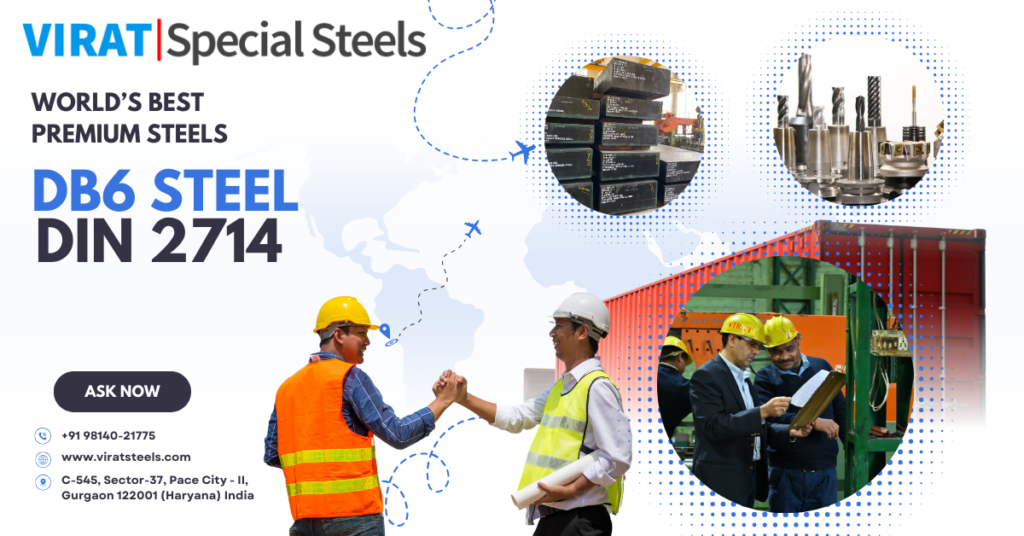
Premium Steel Solutions from Leading Global Manufacturers
Virat Special Steels partners with renowned global steel manufacturers like Swiss Steel DEW, NLMK Verona, Vitkovice, Somers Forge, and Villares Metals. These industry leaders are celebrated for their precision-engineered steel products, combining unparalleled durability and innovation. Now, with Virat Special Steels, Indian industries gain seamless access to these specialty long steel products, offering exceptional quality to match global standards.
Why Virat Special Steels?
1. Reliability
As an official distributor, we ensure direct access to authentic steel products from the world’s top manufacturers. Trust is the cornerstone of our business, and our transparent supply chain guarantees the highest standards of quality and authenticity.
2. Unmatched Quality
Virat Special Steels brings only the best to the table. Our product line includes high-performance steels tailored to meet the specialized needs of industries ranging from automotive and aerospace to energy and heavy machinery. Our flagship offering, DB6, DIN 2714 steel, is a testament to our commitment to quality and innovation.
3. Technical Expertise
With years of experience in the steel distribution industry, we are more than just a supplier. We offer technical insights, guidance, and customized solutions, ensuring your specific industrial requirements are met with precision.
DB6 DIN 2714 Steel: A Benchmark in Excellence
Our premium DB6, DIN 2714 steel is a game-changer, providing:
- Superior Strength: Exceptional durability ensures it stands up to the most demanding applications.
- Versatility: Perfect for forging, die-casting, and industrial tools.
- Precision Engineering: Manufactured to meet stringent global standards, it delivers unmatched performance in every use case.
Empowering Indian Industries
From automotive innovation to advanced tooling solutions, Virat Special Steels is at the forefront of enabling Indian industries to achieve new milestones. Our collaboration with the world’s leading steel manufacturers ensures that businesses in India can remain competitive on the global stage.
Choose Virat Special Steels – Your Partner in Progress
When it comes to premium-quality steel, Virat Special Steels offers unparalleled solutions tailored to the unique demands of your industry. Join us in revolutionizing India’s industrial potential with the world’s best premium steel products. Experience reliability, quality, and technical expertise, all under one roof.
Let’s build the future of India with the strength and precision of world-class steel. Reach out to Virat Special Steels today for your steel requirements!
How can I contact Virat Special Steels for inquiries or orders?
You can reach Virat Special Steels through:
- Phone: +91-98140 21775
- Email: info@viratsteels.com
- Website: www.viratsteels.com
Their offices are located in Gurgaon, Haryana, and Ludhiana, Punjab, India. For more detailed information, you can visit their official website or contact their customer service team.
H13 Steel for Die Casting: Key Benefits You Should Know
H13 steel stands as a cornerstone in the die casting industry. Known for its exceptional heat resistance and toughness, this versatile hot-work tool steel is widely used in demanding environments. As die casting often involves high-pressure and extreme thermal conditions, choosing the right material for dies is critical. Enter H13 steel – the ultimate material to enhance durability, improve performance, and maximize efficiency in casting operations.
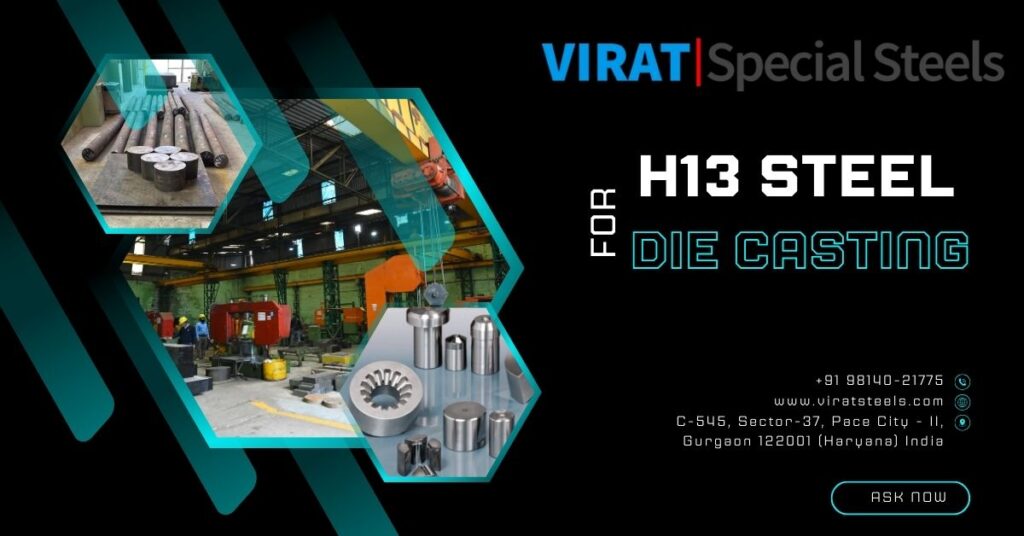
What sets H13 steel apart from the rest? Its outstanding properties make it highly sought after for both small-scale and large-scale die casting applications. But let’s dig deeper into what makes it so special.
Composition and Properties of H13 Steel
Chemical Composition
H13 steel is an alloy comprising a mix of critical elements that optimize its performance. Here’s a breakdown of its main components:
- Chromium (5%): Enhances corrosion resistance.
- Molybdenum (1.4%): Improves hardness and high-temperature strength.
- Vanadium (1%): Increases wear resistance and toughness.
- Carbon (0.4%): Adds strength and hardenability.
- Silicon (1%): Boosts resistance to oxidation.
Mechanical Properties
H13 steel is known for its high tensile strength, ductility, and excellent thermal conductivity. These properties ensure the material remains reliable under rigorous operating conditions. Additionally, H13 steel demonstrates impressive hardenability, making it an ideal choice for precision die applications.
What Makes H13 Steel Ideal for Die Casting?
Thermal Stability
One of the standout features of H13 steel is its remarkable thermal stability. In die casting, molds must endure rapid temperature fluctuations without cracking or deforming. H13’s ability to retain strength at elevated temperatures makes it indispensable.
Resistance to Thermal Fatigue
When dies repeatedly heat and cool during the casting cycle, they are prone to thermal fatigue. H13 steel offers resistance to such stresses, extending the lifespan of the tooling and reducing operational downtime.
Key Benefits of H13 Steel in Die Casting
1. Durability Under High Temperatures
Die casting requires materials that can handle intense heat without losing integrity. H13 steel delivers exceptional performance in such scenarios, maintaining structural stability even under prolonged exposure to molten metals.
2. Excellent Wear Resistance
The abrasive nature of die casting operations can wear down weaker materials quickly. With its robust wear resistance, H13 steel minimizes maintenance needs and offers long-lasting performance.
3. Cost-Effectiveness in Long Production Runs
Although the initial investment in H13 steel may be higher, its durability and resistance to damage translate into significant cost savings over time. Long production cycles benefit greatly from its ability to perform without frequent replacements or repairs.
Longevity and Durability of H13 Steel Dies
Improved Tool Life
When it comes to tooling materials, longevity matters. H13 steel excels in providing longer service life, reducing the need for frequent replacements. Its resilience against wear and deformation significantly adds to the efficiency of the production process.
Resistance to Deformation
Under the extreme pressures of die casting, lesser materials may deform, leading to suboptimal casting results. H13 steel’s resistance to deformation ensures precision and repeatability across countless cycles.
Challenges and Limitations of H13 Steel
Cost Considerations
While H13 steel is cost-effective in the long run, its upfront cost may deter smaller manufacturers. Investing in H13 tooling requires foresight and planning to maximize its return on investment.
Potential Limitations in Specific Environments
H13 steel thrives under high temperatures, but in applications involving extremely corrosive materials or environments, alternative alloys with specific properties might be better suited.
Future Trends in Die Casting Using H13 Steel
Advances in Steel Technologies
Research and innovation are leading to improved formulations of H13 steel with enhanced properties like higher thermal resistance and lower environmental impact. Such developments will further cement H13’s place in the future of die casting.
Emerging Applications and Industries
With rapid advancements in technology, H13 steel’s applications are expanding beyond traditional die casting. Sectors like robotics and renewable energy are beginning to explore its potential, showcasing the steel’s enduring versatility.
Conclusion
H13 steel has revolutionized the die casting industry with its unmatched thermal stability, wear resistance, and adaptability. From improving tool longevity to delivering consistent, high-quality results, it’s clear why this alloy is the material of choice for demanding casting operations. By investing in H13 steel, manufacturers can elevate their production standards, reduce costs over time, and lead the way in sustainable manufacturing.
FAQs
1. Why is H13 steel commonly used in die casting?
H13 steel is ideal for die casting due to its thermal stability, resistance to wear and deformation, and long service life. It is especially effective in high-temperature, high-pressure applications.
2. Can H13 steel be recycled?
Yes, H13 steel is 100% recyclable, making it a sustainable choice for manufacturers committed to reducing waste.
3. How does H13 steel compare to P20 steel?
H13 steel offers superior heat resistance and durability compared to P20, making it more suitable for demanding die casting operations.
4. What industries use H13 steel dies?
H13 steel is widely used in industries such as automotive, aerospace, electronics, and general manufacturing for creating precision die-cast components.
5. What maintenance is required for H13 steel dies?
Regular preventive maintenance, including cleaning, inspections, and refurbishments, is essential to extend the lifespan of H13 steel dies and ensure optimal performance.
Virat Special Steels: A Leader in H13 Steel Supplies
Virat Special Steels is a renowned name in delivering high-quality tool steels, including H13. With decades of industry expertise, Virat has built a reputation for reliability and superior service. Industries across automotive, aerospace, and plastic molding trust Virat for their steel requirements.
Virat Special Steels is the largest Supplier & Stockiest of H13 Steel in India. Consult our team who will assist you for H-13/ DIN 2344 / AISI H13 steel query. https://www.viratsteels.com/h13.html
Size Range in Forged / Rolled Bars:
Rounds: 13mm Dia to 1500mm Dia
Rectangular: Thickness 13mm – 500mm / Width 13mm to 1500mm
For more information or to discuss your steel needs, Virat Special Steels invites you to reach out through their contact details provided, ensuring a professional and informative experience.
Any further queries feel free to contact us :
🌐https://www.viratsteel.in 📬 info@viratsteels.com ☎+91 98140-21775
The Role of DIN 2714 Steel in Forging Industries
The forging industry plays a pivotal role in manufacturing, producing components that form the backbone of various sectors such as automotive, aerospace, construction, and heavy machinery. One material that has emerged as a cornerstone of the forging process is DIN 2714 steel. Renowned for its exceptional properties, DIN 2714 is a hot work tool steel that meets the rigorous demands of forging operations. This blog delves into the characteristics, applications, and benefits of DIN 2714 steel, highlighting its indispensability in the forging industry.
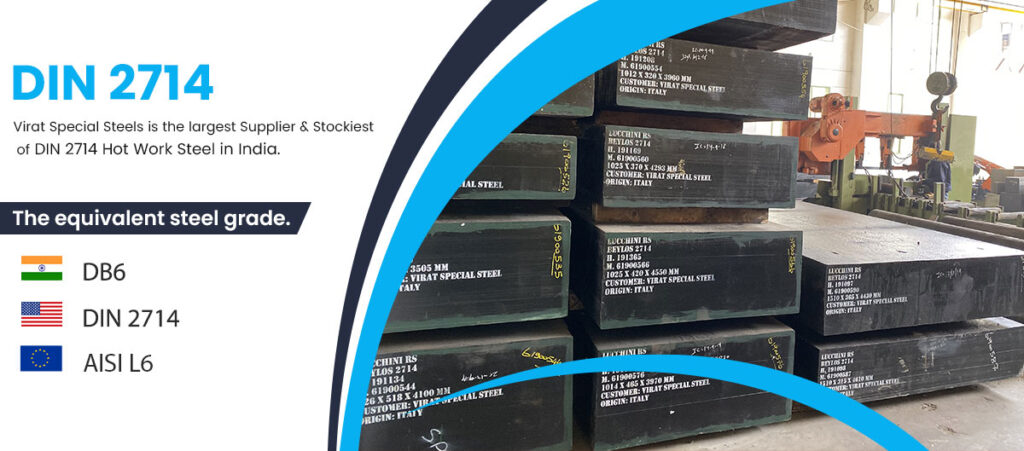
Understanding DIN 2714 Steel
DIN 2714 is a German-standard steel, widely recognized for its high wear resistance, toughness, and thermal stability. It belongs to the family of alloyed steels that exhibit excellent mechanical properties, making it ideal for use in hot forging tools. The composition of DIN 2714 typically includes:
Carbon (C): Contributing to hardness and strength.
Silicon (Si): Enhancing heat resistance.
Manganese (Mn): Improving toughness and hardenability.
Chromium (Cr): Providing corrosion resistance and strength.
Molybdenum (Mo): Increasing high-temperature strength and creep resistance.
This combination of elements gives DIN 2714 its unique ability to withstand extreme operating conditions while maintaining dimensional stability.
Key Properties of DIN 2714 Steel
- High Toughness: With its exceptional toughness, DIN 2714 resists cracking and – chipping, even under heavy loads.
- Excellent Thermal Stability: The steel maintains its mechanical properties at elevated temperatures, making it perfect for hot work applications.
- Wear Resistance: The material can endure prolonged exposure to abrasion, increasing the longevity of forging dies and tools.
- Hardenability: DIN 2714 can achieve a consistent hardness profile, ensuring uniform performance across the material.
Applications in the Forging Industry
DIN 2714 steel’s properties make it indispensable in several forging processes. Some of its primary applications include:
- Forging Dies: The wear resistance and toughness of DIN 2714 make it an excellent choice for dies used in drop forging and upset forging.
- Hot Shear Blades: The steel’s ability to maintain hardness at high temperatures is ideal for cutting hot metal billets.
- Extrusion Tools: DIN 2714’s thermal stability and wear resistance are advantageous in metal extrusion processes.
- Press Tools: These tools require materials that can withstand repeated stress and high impact, making DIN 2714 a preferred choice.
Benefits of Using DIN 2714 Steel
- Increased Tool Life: The superior wear resistance and toughness reduce the frequency of tool replacement, cutting down costs and downtime.
- Improved Efficiency: The steel’s thermal stability allows tools to operate efficiently under high temperatures, enhancing production rates.
- Cost-Effectiveness: Although the initial investment may be higher, the extended tool life and reduced maintenance offset the costs, delivering long-term savings.
- Enhanced Performance: Tools made from DIN 2714 ensure precise and high-quality forging results, meeting stringent industrial requirements.
Conclusion
The forging industry demands materials that can withstand extreme conditions while delivering consistent performance. DIN 2714 steel checks all these boxes, making it a preferred material for manufacturing critical forging tools. By choosing DIN 2714, industries can achieve enhanced productivity, reduced operational costs, and superior product quality.
At Virat Special Steels, we are committed to delivering the highest quality DIN 2714 steel tailored to meet the diverse needs of the forging industry. Partner with us to unlock the potential of this exceptional material and elevate your forging operations to new heights.
FAQ: The Role of DIN 2714 Steel in Forging Industries
1. What is DIN 2714 steel?
DIN 2714 is a German-standard hot work tool steel known for its excellent toughness, wear resistance, and thermal stability. It is widely used in the forging industry for its ability to withstand high temperatures and heavy mechanical loads.
2. What are the key components of DIN 2714 steel?
The primary components of DIN 2714 steel include:
- Carbon (C) for hardness and strength.
- Silicon (Si) for heat resistance.
- Manganese (Mn) for toughness and hardenability.
- Chromium (Cr) for corrosion resistance and strength.
- Molybdenum (Mo) for high-temperature strength.
3. Why is DIN 2714 steel preferred in the forging industry?
DIN 2714 steel is preferred due to its combination of high toughness, wear resistance, thermal stability, and hardenability. These properties make it ideal for manufacturing forging dies, hot shear blades, extrusion tools, and press tools.
4. What applications is DIN 2714 steel suitable for?
DIN 2714 steel is commonly used in:
- Forging dies
- Hot shear blades
- Metal extrusion tools
- Press tools for hot work applications
5. What are the benefits of using DIN 2714 steel in forging?
The key benefits include:
- Prolonged tool life due to high wear resistance
- Improved efficiency in high-temperature operations
- Cost-effectiveness through reduced maintenance and downtime
- Consistent and precise forging results
6. How does DIN 2714 compare with other hot work tool steels?
DIN 2714 stands out for its balanced properties, such as toughness, wear resistance, and heat resistance. It offers an optimal combination of durability and performance, making it a reliable choice for heavy-duty forging tools.
7. Can DIN 2714 steel be customized for specific applications?
Yes, DIN 2714 steel can be heat-treated and machined to meet specific requirements of different forging applications. Working with a trusted supplier ensures customization tailored to your operational needs.
8. What is the typical service life of tools made from DIN 2714 steel?
The service life varies based on the application, maintenance practices, and operating conditions. However, DIN 2714’s durability ensures longer tool life compared to many other materials.
9. How should DIN 2714 steel be maintained to maximize its performance?
Proper maintenance includes regular inspection for wear, timely heat treatment, and ensuring that tools operate within their recommended temperature range. This helps in prolonging the tool’s service life.
10. Where can I source high-quality DIN 2714 steel?
Virat Special Steels is a trusted supplier of premium DIN 2714 steel, offering products tailored to the needs of the forging industry. Contact us to learn more about our offerings and how we can support your business.
Mode of Supply:
Virat Special Steels is the largest stockiest and supplier of DIN 2714 tool steel in flat, square and round bar. We provide steel in all sizes as your requirements. DIN 2714 die steel is available in flat, square and round shape.
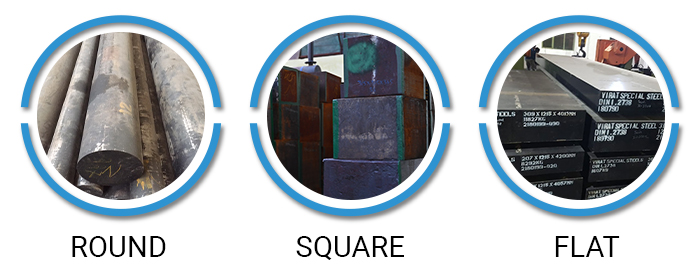
Consult our team who will assist you for DIN 2714 steel query.
https://www.viratsteels.com/din-2714.html
🌐https://www.viratsteels.com 📩info@viratsteels.com 📲+91-98140-21775






